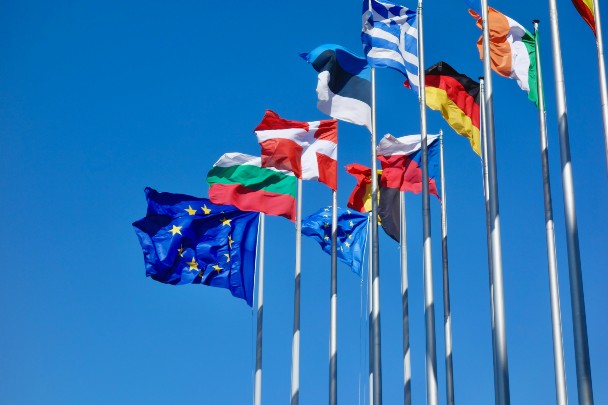July 04, 2024 Industry news
Back in June, we had the pleasure of speaking and exhibiting at Digital Construction Week 2024, the UK’s leading event focused on innovation and technology in the built environment.
Featuring over 300 speakers, 150 exhibitors and more than 120 hours of content, this exciting two-day event offered many valuable opportunities to learn about the latest trends in digital construction, from BIM and AI to robotics, sustainable solutions and more.
In one of these sessions, we were joined by some of our European colleagues for a roundtable discussion on how GS1 standards are shaping the future of construction on the continent and how new EU legislative demands could impact UK businesses.
Titled “Digital product passports: how to prepare for upcoming construction regulation updates” and hosted by GS1 UK director of industry engagement Iain Walker, it featured Knut Mathisen, Head of construction at GS1 Norway, Frits van den Bos, Innovation manager at GS1 Netherlands and Lars Christian Fredenlund, Co-founder and CEO of Cobuilder.
Together, they explored important updates surrounding the digital product passport (DPP), the drive for a more sustainable European construction sector, how these changes could affect UK construction and the steps businesses can take to prepare. Read on for an overview of the key insights shared.
The EU context
Governments, consumers and businesses alike are demanding greater transparency on the environmental impact of the products they consume.

This is especially true in Europe, where the EU is committed to becoming the first climate-neutral region in the world by 2050.
To support this ambition, the European Green Deal was drawn up along with several other pieces of legislation including the proposal for a new Ecodesign for Sustainable Products Regulation (ESPR).
One of the main instruments of this policy is the digital product passport (DPP).
Expected to come into effect from 2027, the DPP will set new standards for how product information is shared among businesses, their consumers, and authorities.
What is a DPP?
A DPP is a mechanism for electronically registering, processing and sharing product information between producers, businesses, authorities and consumers.
It provides clear, structured and accessible data on a products characteristics and components, the origin of materials, production methods and any other relevant information.
The objective of the DPP is to simplify digital access to relevant product-specific information on sustainability, traceability, circularity, and legal compliance.
How does it work?
A DPP essentially creates a digital twin of a physical product and securely records event, transactional and sustainability-based data.
This digital twin is connected to the physical product itself via a QR code, barcode or other tagging solution. This can be scanned to illustrate the product’s sustainable, environmental and recyclability attributes, allowing stakeholders to obtain all relevant information, throughout the entire life cycle of products.
Key benefits
Functioning as a digital label, the DPP allows a vast array of trusted information to be seamlessly shared throughout the supply chain.
In the context of construction, DPPs hold significant potential for improving transparency, efficiency and sustainability throughout the life cycle of a building. By tracking the origin and composition of building materials, they facilitate responsible sourcing practices and discourage the use of conflict minerals or environmentally harmful materials.

They can capture valuable information about a product’s journey throughout the supply chain including details about manufacturing processes and labour practices, empowering stakeholders to make informed decisions and improve their operations.
By allowing instant, seamless data exchange, DPPs not only reduce the risk of manual entry errors, they can also boost efficiency by reducing the time and costs associated with correcting issues and sourcing new or replacement parts.
As demonstrated by EU’s decision to implement them under the ESPR, many of the key benefits offered by DPPs are related to sustainability.
The transparency they enable can help ensure compliance with environmental regulations, support sustainability certifications and will encourage businesses to take greater responsibility for the impact of their projects and sourcing practices. They could also be used to trace the reuse and recycling potential of construction products and materials once they reach the end-of-life stage, promoting a more circular approach and minimising waste.
DDP and the CPR
The EU’s Construction Products Regulation (CPR) could push forward the adoption of digital product passports. Since its inception in 2011, the CPR has served as the bedrock for ensuring reliable and high-quality construction products within the EU market, setting harmonised rules for marketing and usage.
By establishing a framework for assessing, capturing and expressing the performance of construction materials across Europe, it ensures they meet the safety, health, and environmental requirements required for the CE (Conformité Européenne) marking.

Harmonised standards, developed by European bodies, create a common technical language for the industry, enabling seamless trade within the EU. However, recognising the need to support green and digital transformation across the construction sector, the EU Commission is revising the CPR.
This revised regulation, expected to be finalised by Autumn 2024, places a strong emphasis on digital solutions.
A key element of this modernisation is the introduction of a construction product database and the DPP digital. The DPP will provide a comprehensive record of a product's environmental data throughout its entire lifecycle, fostering transparency and traceability across the entire supply chain.
Standardisation will be fundamental if DPPs are to reach their full potential. The revised CPR proposes a common data dictionary and "common digital language" for the industry. This will ensures that all stakeholders can readily understand product information and collaborate seamlessly across borders.
The role of GS1
GS1 has been proactively engaging with businesses and policymakers throughout Europe to raise awareness about the DPP, its benefits and support the development and implementation of a solution that works for all.
GS1 standards provide the interoperability required to realise the full benefits of DPP, providing a suitable structure for the safe and efficient sharing of information across complex international networks.
EU proposals have indicated that that unique identification for DPPs can be carried out using existing identifiers. Given their ubiquity, GTINs are well suited to powering the implementation and GS1 data carriers such as QR codes powered by GS1 could offer the perfect solution for enabling electronic access to DPP data.
Key dates
In terms of the timeline surrounding implementation, some key dates UK businesses need to be aware of include:
- Summer 2024 – basic data requirements are to be defined by EU after European Elections (6-9 June)
- Starting from 2027 – more detailed, sector-specific requirements will be unveiled
- By 2030 – The Legislative process will be concluded and the DPP will be in full operation
The impact on UK businesses and how to prepare
While the DPP may be an piece of EU legislation, it's impact on any UK businesses that operates within or trade with the EU is set to be significant.

The crucial thing to be aware of here is that no DPP means no access to the single market. If any of your products are sold anywhere in the EU, they will need a DPP.
While 2030 may seem like a long way off, there is a lot to be done and clock is ticking.
If you need a DPP, you will need to ensure that you have robust systems in place for efficiently gathering, handling, and sharing the necessary data. This could require you to invest new technologies and tools for data management.
So get your house in order. The increased transparency DPPs demand could also expose potentially sensitive information so ensure your supply chain – and those of your suppliers - are in order.
The time to start is preparing now! Although the regulation is not yet in force, you can already provide the basic product information that will be required for DPP. This will make the transition much easier once it becomes mandatory and could give you a competitive edge.
And remember, GS1 UK is here to help. We have the expertise, technical ability and industry/public policy knowledge to help you prepare and our European colleagues are actively involved in the development of the DPP.



